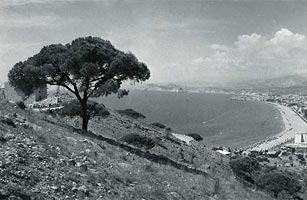
Levante Beach: The tiny fishing village of Benidorm had few assets — two sandy beaches and lots of sun. Today, it hosts more than 5 million visitors per year
(3 of 3)
It isn't just the absence of Jews that has, for 50 years, made Europe a less diverse place than it should be. There's also the matter of the missing Germans — the great taboo of modern European history. In the last year of World War II and its aftermath, some 9 million Germans were driven out of their ancestral homes in eastern Europe. That has changed societies in ways large and small. Blodig reminded me, for example, that before 1939, the culture of Prague was a mixture of Czech, Jewish and German influences. Today Prague is a monoethnic city. With the expulsion of the Germans and the reordering of borders after 1945, the nations of eastern Europe are, for the first time, pretty much ethnically homogeneous, devoid of minorities, so long as one turns a blind eye to the shameful condition of the Roma. The political entity of Poland, for example, is also the place where Poles — and only Poles — live. That has never been true before.
For Poles, and other central and eastern Europeans, the capturing of national identity after years of oppression under the communists is understandably a matter of pride. It should surprise nobody that substantial majorities in the former communist states are skeptical about the wisdom of subordinating their new independence to the institutions of the European Union. If you wanted to be really pessimistic, you might conclude that it is in central and eastern Europe that extreme nationalism might raise its head once again. I don't think that will happen. The post-communist nations may be ethnically homogeneous, but people don't have to stay in them. Having the wealth and freedom to wander around the Continent — and the world — is the single most important change in Europe in the last 50 years. I spent an evening in Prague drinking beer with a bunch of twentysomethings. One had spent a year as an au pair in London; one planned to take a graduate course in Dublin; one had studied at an American high school; one had just returned from a semester in Thessaloniki. For all of them, it was the ability to travel freely that most distinguished their lives from those of their parents.
It is in this shifting population of young Europeans that I find true optimism about the future. I don't mean to imply that all national distinctions are in the process of being abolished; plainly, that is not the case. But there is now a generation of Europeans that are able to make friends anywhere, talk about the same soccer teams, drink the same beer, dance to the same music, and, not least, speak the same language. It is, after all, not the deliberations of political leaders but the quotidian actions of countless individuals from which a society takes its strength. "We don't have a perfect democracy," says John Bok, speaking of the Czech Republic after the velvet revolution, "but we have freedom to make our own decisions." That's not everything, but compared with the past, it's enough. Milos Zika, 68, a retired Czech engineer, has seen it all. He's old enough to remember the Germans riding motorcycle sidecars through the snow into Prague in 1939, to have listened with his family — on pain of death — to the BBC's call sign Volá Londyn during the war, to have seen boys from Siberia and Kazakhstan sleeping on their tanks after the invasion in 1968, and East Germans flock into the city in their Trabants in the summer of 1989, hoping to get out to the West.
Finally, in November of that year, he was in the crowd in Wenceslas Square when Havel gave a rotten regime the little push that was needed to knock it over. After the communists fell, says Zika, "many people thought that life would be 100% perfect, but that's not how life works." Still, he continued, he's satisfied and optimistic. "People have plenty of food, they have friends, they have a washing machine and a food processor, they have four mobile phones."
Everyone knows that there are large and difficult issues facing Europe, new and old. An aging population, weak political leadership, an unresolved tussle between national identity and supranational power, an unwillingness to make the investments in the armed forces that would allow Europe to claim an equal partnership with its American allies, an economy whose green shoots rarely seem to grow and bear fruit. But measured by its relaxed mood and the evident happiness of its people, Europe today is simply on a different planet from the Europe of 50 years ago. On the last night of my trip — July 13 — I was walking across the Boulevard St. Michel in Paris when I bumped into an old American friend. He told me that he was taking up the tango, and when I asked him why, he suggested we take a stroll along the banks of the Seine opposite the Ile St. Louis. In a makeshift amphitheater, a drop-dead gorgeous crowd were tangoing away, while families picnicked nearby, and a full moon sailed into a cloudless sky. Later that night, in the oh-so-cool passages of the Marais, I stumbled upon a block party. Someone had set up a sound system on the sidewalk, and young and old, gay and straight, black, white and brown were grooving to salsa in the street.
Divided, poor and hungry 50 years ago, Europe has become a society where the eve of a national holiday is celebrated by dancing under the stars. If that doesn't make you feel good about the place, nothing will.